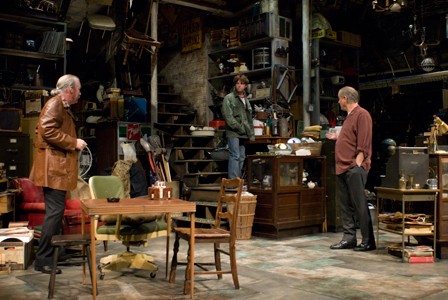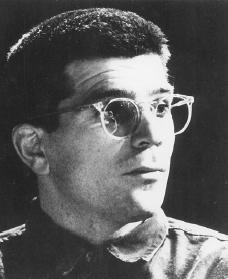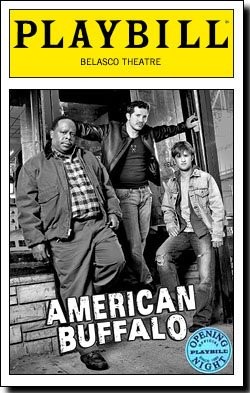Mamet's American Buffalo at the Steppenwolf
Chicago Welcomes Back Its Homies
By: Susan Hall - Dec 29, 2009
American Buffaloby David Mamet
Directed by Amy Morton
Featuring: Patrick Andrews, Francis Guinan, Tracy Letts
Steppenwolf Theatre
Chicago
Through February 7
The world-renowned Steppenwolf Theater performed David Mamet's "American Buffalo." Mamet is a Chicago playwright, and inherits the language of the Windy City, the dialect of James T. Farrell and Nelson Algren. The pace of city life is incorporated, and reflects a world in which every second counts and danger lurks around every corner. All the bold, direct coinage of Chicago informs this iconic play, for which Mamet won an Obie in New York, after a premier at the Goodman. While the Goodman has a founder's claim on Mamet, this Steppenwolf production is steeped in Chicago and the script seems as fresh as tomorrow.
This comic drama focuses on three petty criminals who plot to steal a rare Buffalo Nickel. It deservedly established Mamet's reputation and has attracted top acting talent from the beginning -- Robert Duvall and William H. Macy come immediately to mind.
Steppenwolf has presented this play as the second in a series on "faith" and in a post play discussion, talk focused on the "belief" theme. Whether Bobby's not-to-be-believed lie is the prompt for the action that follows. All three men have a false belief that they can alter the downward trajectory of their lives which are never going to end on Chicago's gold coast, Lake Shore Drive. That's an address not far from the scruffy junk shop they inhabit. The set by Kevin Depinet is brilliantly conceived in a basement, from which the characters have to somehow escape up the stairs. It reflects the character Teach's cry "We live like cavemen."
Steppenwolf is an ensemble theater and the director Amy Morton, Francis Guinan playing Don, and Tracy Letts as Teach, have worked together often. This shows.
The most recent mounting of the play on Broadway by the artistic director of the Goodman, Robert Falls, failed. New York is always tempted by big names, and John Leguizamo, Cedric the Entertainer, and Haley Joel "The Sixth Sense" Osment may have yielded advance ticket sales, but the actors didn't work together, The play closed soon after its opening.
Although Morton does not talk about her concept of play in these terms. She presented omething I had not seen before with Al Pacino, or in the Dustin Hoffman movie in which Dennis Franz, a Chicago born actor of NYPL Blue, created Don. In her production each of the onstage characters has a unique voice and presentation of language. The language of the street must arrest. The necessity of quick, tumbling delivery is often discussed, but the characters are not distinguished.
In this production, Bob is slow-witted, immobilized, his lines delivered in a flat, muted, staccato. He crescendos when he is pinned in a lie, but maintains the inflexible, no-affect talk.
Don is sometimes discussed as the top of a three generation family-like group, but here he and Teach are about the same age. Occasionally we get the punchy jewels "action talks, bullshit walks." Don's diction is clearly different from the others. He may be street smart, but he is also kindly and soft, and his feeling for the young Bob is expressed with warmth. When he carefully listens to Teach rail against Fletch, the "Godot" of this play, He is an offstage character who is going to pull this heist off and who doesn't show up. Don addresses Teach as "Walt." Walt, I wondered.
In the Samuel French edition of the play, the character of Teach is a nickname for Walter Cole. In this scene, when Teach tries to bump Fletcher out of the deal, Don is trying to talk him around, Teach might get a smaller take, but at least there would be a take. Teach is never addressed as Walt again after he finishes trashing Fletch as a cheater at cards and everything else.
Teach is a stark contrast to Don. He is less driven by mania, than by a need to express not just every thought but every word that crosses his mind in no matter what order. This leads to some of the most brilliant and familiar lines in the play: The syntactical frenzy of "They treat me like an asshole. They are an asshole." "Only, and I am telling you this, Don. Only, and I am not, I don't think, casting anything on anyone: from the mouth of the Southern bull dyke asshole ingrate of a vicious nowhere cunt can this trash come." Teach often delivers his lines as an aria. Don and Bob are left to recitative. There is no common time between the three voices, and this excites the ear and mind.
Nothing is stale or withered about the play and the operatic take on the language, the crossing of the three voices, adds to its impact. Letts has gale force as Teach, Francis Guinan is emotionally rich, and the young actor Patrick Andrews playing Bob is terrifyingly brittle, almost inarticulate.
The language of the play always demands attention, but in this Steppenwolf production we are forced to special alertness and sensitivity. You can't turn off or away from "Lookit, sir, if I could get a hold of some of that stuff you were interested in, would you be interested in some of it?"
Teach's hat, which he has misplaced, is a search line from beginning to end. He finally makes a hat out of newspaper, recalling Elizabeth Bishop's poem about Ezra Pound in the ward of an insane asylum: "This is a Jew in a newspaper hat that dances weeping down the ward" and then joyfully dancing down the ward, dancing carefully down the ward -- all in the house of Bedlam." Certainly the heart of "American Buffalo" is close to madness driven by repeated failures and dashed hopes.
These performers act in the moment and take each other by surprise. Steppenwolf is at the pinnacle of ensemble theater and this production a testament to actors working together closely. It is an immortal play about belief, perhaps, but also about things -- perceived value, and what one will do to get objects, junk or no. "American Buffalo" felt very now as I pondered bundled mortgages, the self-talk of the bundlers, the bought appraisals, and the con, which sure has succeeded in our time.
"American Buffalo" continues at Steppenwolf through February 7. "The Brother/Sister plays" by Tarell Alvin McCraney begin their run on January 21. Well worth a trip to the not so second city!






